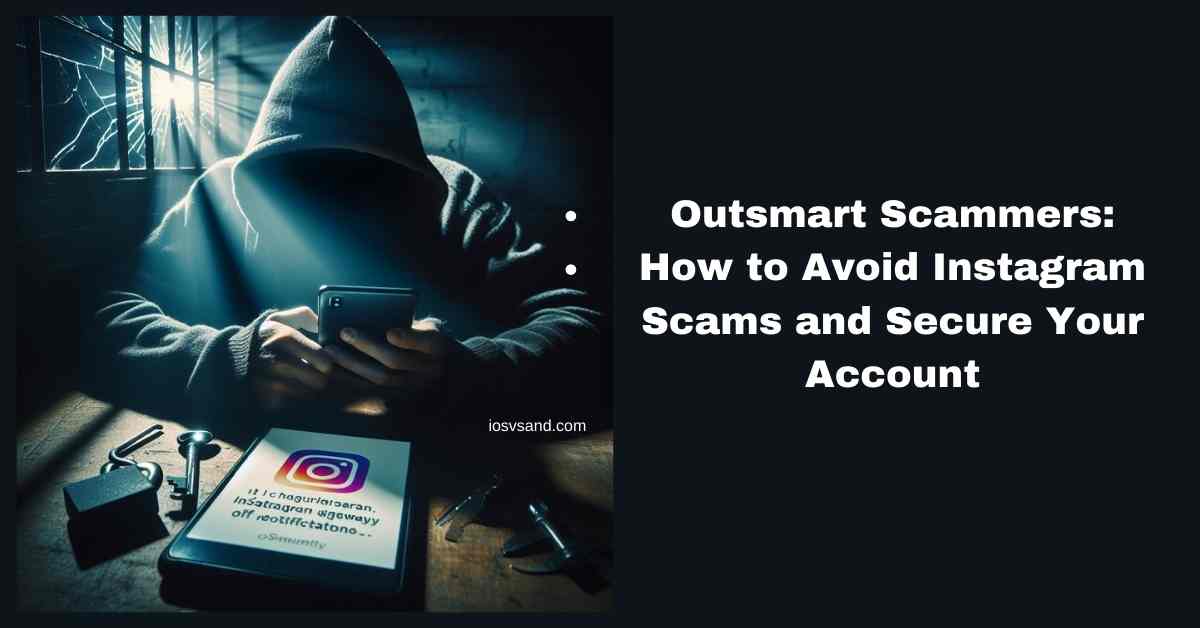Let's be brutally honest: most so-called "smart" home tech is dumber than a bag of…

Don’t Fall Victim: Essential Guide to Avoid Instagram Scams That Could Drain Your Account (2025 ver.)
Navigating the Risks: Instagram Scams EXPLAINED
Instagram. Pictures of food 🍔. Cute animals 🐩🐈⬛. And… BAD GUYS (scammers)!⚠️ They’re EVERYWHERE. Like digital ninjas. They TRICK people for MONEY. This REPORT is gonna tell you HOW in SIMPLE words. So you don’t get BAMBOOZLED. Instagram is like a GIANT PLAYGROUND. Lots of people. Easy to HIDE. Easy to PRETEND. Scammers LOVE it. They use FAKE profiles. They send SNEAKY messages. They try to get your MONEY and INFO. It’s a BIG PROBLEM, and it’s getting WORSE in 2024 and 2025. Even though the Insta-POLICE (Meta) are trying to catch them, YOU gotta be SMART. This REPORT will show you the BAD GUY MOVES. We’ll give you the SAFETY RULES. So you can keep your Insta-FUN without getting SCAMMED.
WHY SHOULD YOU CARE? <– Because losing your Insta-FAME (and money) sucks.
STAKES ARE REAL. <– Real consequences mean you could lose your CASH or your SECRETS.
- Decoding the Deception: BAD GUY MOVES on Instagram 🎭
- Deceptive Methods and Techniques Used by Scammers: BAD GUY TOOLS! 🛠️
- Psychological Manipulation in Instagram Scams: HOW They Mess With Your Feelings! 🧠
- Recent Trends and Real-World Examples: WHAT’S NEW, BAD GUYS? 📈
- Key Scam Statistics: NUMBERS ARE SCARY! 📊
- Identifying and Avoiding Instagram Scams: BE A SCAM DETECTIVE! 🕵️
- The Impact of Instagram Scams on Victims: SAD STORIES! 😭
- Resources and Support for Scam Victims: HELP IS HERE! 🆘
- Key Resources and Support Organizations for Instagram Scam Victims: MORE HELP! 🤝
- Combating Instagram Scams: WHAT’S BEING DONE? 🛡️
- Recommendations for Users and Platforms: HOW TO MAKE THINGS BETTER! ✅
- Conclusion: Stay SAFE on Insta! <– You Got This! 💪📸
- FAQs
Decoding the Deception: BAD GUY MOVES on Instagram 🎭
Instagram SCAMS are like a MAGIC SHOW… but the trick is on YOU. BAD GUYS have LOTS of tricks. They try different things to FOOL different people. We can put these tricks into BIG GROUPS.
Group 1: Fake Money (Crypto Scams) <– Shiny Coins, Empty Pockets!
BAD GUYS talk about FAKE MONEY (cryptocurrency). Bitcoin! Dogecoin! Sounds COOL and FANCY. They say you can make LOTS of money FAST. Like magic! They use FAKE “influencers” (people who look popular) to say it’s REAL. They want you to SEND them your REAL money to buy the FAKE money. But GUESS WHAT? The fake money is FAKE. Your REAL money? GONE. The FBI says this is a HUGE SCAM on Instagram. Like losing ALL your candy money! <– DON’T FALL FOR IT!
Group 2: Fake Jobs (Employment Scams) <– Work From Home… and Get Played!
Looking for a JOB? BAD GUYS PRETEND to be hiring. They say you can work from your COUCH. Easy peasy! HIGH PAY! But they need your INFO first. Like your BIRTHDAY and SOCIAL SECURITY NUMBER (that’s like your SECRET CODE!). They say it’s for “direct deposit” (getting paid). But they just want to STEAL your IDENTITY. Sometimes, they even want YOU to PAY THEM a “fee” to get the job! That’s like paying someone to let you WORK for them! THAT’S WEIRD! <– REAL JOBS DON’T DO THAT!
Group 3: Sneaky Links (Phishing Scams) <– Don’t Click the Bait!
BAD GUYS send you SECRET MESSAGES or EMAILS. They look like they’re from Instagram or Meta (the boss of Instagram). They say your ACCOUNT is in trouble! Your ADS are gone! CLICK HERE to fix it! But the LINK takes you to a FAKE website. It looks JUST LIKE Instagram. But it’s a TRAP! They want you to TYPE in your PASSWORD. Then they STEAL your account! Like a sneaky thief in the night! <– ALWAYS DOUBLE-CHECK!
Group 4: Fake Presents (Fake Giveaway Scams) <– You Didn’t Win ANYTHING!
“CONGRATULATIONS! You WON!” Says a message from a FAKE account that looks like a famous brand or a cool influencer. You didn’t even ENTER! They say you just need to give them your INFO or pay a small fee for “shipping.” But there’s NO PRIZE. They just want your INFO or your MONEY. Like someone promising you a HUGE toy but then saying you need to pay them first… and then NO TOY! <– BE SUSPICIOUS!
Group 5: Fake Love (Romance Scams) <– Heartbreak Hotel!
BAD GUYS make FAKE profiles. They look HANDSOME or BEAUTIFUL. They talk to you. They act like they LOVE you. They say SWEET things. They build a FRIENDSHIP. Then… they ask for MONEY. For a “sick family member.” For a “plane ticket to see you.” It’s all a LIE. They break your heart AND steal your money. It’s called “romance baiting” – they use fake love as BAIT. <– BE CAREFUL WHO YOU TRUST ONLINE!
Group 6: Fake Stuff (Shopping Scams) <– Looks Good, Is BAD!
Want CHEAP stuff? BAD GUYS post pictures of FANCY things. Designer bags! Cool shoes! SUPER CHEAP prices! But the stuff is FAKE. Or it doesn’t even EXIST. You send them money. You get NOTHING. Or you get something that looks like it came from a garbage can. They use FAKE accounts that look like REAL brands. <– IF IT’S TOO CHEAP, IT’S PROBABLY FAKE!
Group 7: Fake Money Tricks (Money Flipping Scams) <– Double Your Money? NAH!
“Send me $100, I’ll send you back $1000!” Sounds AMAZING, right? BAD GUYS promise to “flip” your money. Make it GROW super fast. But it’s a TRICK. You send them your $100. They keep it. You get NOTHING back. It’s like throwing your money into a black hole! <– NOBODY GIVES AWAY FREE MONEY!
Group 8: Fake Deals (Sponsorship/Ambassador Scams) <– Free Stuff… With a Secret Cost!
Got a cool Instagram? BAD GUYS pretend to be brands. They say, “We LOVE your Insta! Be our AMBASSADOR!” They offer you “free stuff” or money. But then they ask for your BANK INFO. Or they say you need to BUY their stuff first to become an ambassador. REAL brands DON’T make you pay to represent them! <– CHECK IF THE BRAND IS REAL!
Group 9: Fake Art Buyers (Art Muse/Mural/Commission Scams) <– Creative Scams for Creative Souls!
Are you an ARTIST? BAD GUYS will contact you. They LOVE your work! They want to use your photos for a MUSEUM! Or they want you to paint a MURAL! They offer you money. But then they ask for a small fee for “supplies” or to “prove” you’re real. Or they send you a FAKE big check and ask you to send back the extra money. It’s a TRICK to steal your money. <– GET PAID AFTER YOU DO THE WORK!
Group 10: Fake Help (Account Recovery Scams) <– Don’t Let Them “Help” You!
Worried about your Instagram account? BAD GUYS will send you messages pretending to be from Instagram SUPPORT. They say your account is in danger! Click here to “verify” it! But the link takes you to a FAKE page. They want your PASSWORD so they can STEAL your account. Or they trick you into giving them a special code that lets THEM log in! <– INSTAGRAM WON’T ASK FOR YOUR PASSWORD IN A DM!
Group 11: Fake Friends (Impersonation Scams) <– Who Are You REALLY Talking To?
BAD GUYS make FAKE profiles that look like your FRIENDS. Or they HACK into your REAL friends’ accounts. Then they send you messages. Asking for HELP. Sharing a “cool” link. Saying someone you know DIED (with a link to a fake news story!). They want you to CLICK the link (it’s BAD!). Or they ask for MONEY. Because it looks like it’s coming from someone you TRUST. <– ALWAYS DOUBLE-CHECK WITH YOUR FRIEND IN REAL LIFE!
Deceptive Methods and Techniques Used by Scammers: BAD GUY TOOLS! 🛠️
BAD GUYS use CLEVER tricks to fool you.
Trick 1: Mind Games (Social Engineering) <– They Mess With Your Head!
They make you feel like you HAVE to act NOW. Your account is in danger! You’ll miss out on a great deal! They PRETEND to be important people. Instagram staff! Police! They try to make you TRUST them by saying sweet things or acting like they care. They know what you WANT (money, love, a job), and they use that against you.
Trick 2: Fake Faces (Fake Profiles and Impersonation) <– Not Who They Say They Are!
They use FAKE pictures. Sometimes, they steal them from other people. Or they use computer-made faces! They copy the words from REAL profiles. They buy fake followers to look popular. They PRETEND to be famous people, brands, or even your friends!
Trick 3: Secret Messages (Phishing via Direct Messages and Emails) <– Sneaky Digital Notes!
They send you MESSAGES that look REAL. But they have BAD LINKS. Don’t click! They want your SECRETS (passwords, bank info). They might even pretend to be your FRIENDS asking for help.
Trick 4: Bad Links (Malicious Links and Websites) <– Digital Traps!
They put BAD LINKS in their profile, in their stories, or in messages. These links take you to FAKE websites that look like Instagram or other places. They want you to TYPE in your info. Or they might try to put BAD PROGRAMS on your phone.
Trick 5: Using Instagram’s Own Stuff (Exploiting Platform Features) <– Turning Good Things Bad!
They use GIVEAWAYS and CONTESTS to get your info. They use “brand deals” to steal your money. They even use fun things like QUIZZES to learn your secrets (like your favorite pet’s name for password recovery!).
Psychological Manipulation in Instagram Scams: HOW They Mess With Your Feelings! 🧠
BAD GUYS are good at playing with your BRAIN.
Feeling 1: Hurry Up! (Creating a Sense of Urgency) <– Act NOW!
They make you feel like you HAVE to do something RIGHT NOW. Or you’ll miss out! Your account will be gone! The prize will disappear! Don’t let them RUSH you!
Feeling 2: Trust Me, I’m Important! (Leveraging Authority and Trust) <– Fake Bosses!
They pretend to be from Instagram. Or the POLICE. Or a FAMOUS person. They want you to TRUST them because they sound important. But they’re FAKE!
Feeling 3: I Love You! (Building Emotional Connection – Love Bombing) <– Too Much Too Soon!
In romance scams, they say “I LOVE YOU” super fast. They send lots of sweet messages. They make you feel special. It’s a trick to make you TRUST them so you’ll send them money later.
Feeling 4: Easy Money! (Exploiting Greed and Financial Desperation) <– Sounds Too Good To Be True!
They promise you can make LOTS of money really easily by investing in fake crypto and getting a high-paying job for doing nothing! Flipping money! If it sounds too good to be true… IT IS!
Feeling 5: You’re Special! (Creating a False Sense of Community or Exclusivity) <– You’re One of the Lucky Few… NOT!
They say you’re a “lucky winner” of a giveaway you never entered. Or you’re invited to be a special “brand ambassador.” They want you to feel special, so you’ll give them your information or money.
Recent Trends and Real-World Examples: WHAT’S NEW, BAD GUYS? 📈
Scams are always changing. Here’s what’s happening NOW:
Trend 1: Robot Scammers (Rise of AI-Powered Scams and Deepfakes) <– Scary Tech!
BAD GUYS are using COMPUTERS to make their scams better. They can write FAKE emails that sound REAL. They can even make FAKE VIDEOS of people saying things they never said (deepfakes!). They use computer programs (chatbots) to talk to you, so you don’t know it’s a robot.
Trend 2: Super Sneaky Phishing (Increased Sophistication of Phishing Attacks) <– Harder to Spot!
The FAKE Instagram messages and websites look even MORE REAL now. They use fake chatbots to talk to you and trick you into giving them your info. They even make fake “support” pages that look just like the real thing.
Trend 3: Money, Money, Money (Focus on Financial Scams) <– They Really Want Your Cash!
Most scams on Instagram are about STEALING your money. Fake investments, fake jobs, fake crypto… they all lead to you losing your hard-earned cash.
Trend 4: Real People Getting Scammed (User Testimonials and Real-World Examples) <– It Happens to EVERYONE!
People are sharing their stories about getting scammed on Instagram. A sports guy lost a LOT of money clicking on a fake ad. People are losing money on fake crypto coins promoted by fake influencers. Even teenagers are running scams!
Trend 5: Sneaky Love Scams (Evolving Tactics in Romance Scams) <– They’re Getting Better at Breaking Hearts!
Romance scammers are using AI to talk to you and build trust faster. They’re also getting better at convincing you to invest in fake money schemes.
Key Scam Statistics: NUMBERS ARE SCARY! 📊
- In 2024, people lost $1.9 BILLION to scams! That’s a 25% INCREASE! (Source: FTC)
- The average person who fell for an investment scam lost over $9,000! (Source: FTC)
- The most common scams on Instagram are about INVESTMENTS, JOBS, and FAKE MONEY (cryptocurrency). (Source: FTC)
- In Singapore in 2024, people lost $1.1 BILLION to scams, with Instagram being a big problem! That’s a 70.6% INCREASE! (Source: ScamShield Singapore)
- In 2023, people lost $3.9 BILLION to investment fraud, with CRYPTOCURRENCY being a big part of that! (Source: FBI)
Identifying and Avoiding Instagram Scams: BE A SCAM DETECTIVE! 🕵️
Here’s how to spot the BAD GUYS and stay SAFE.
Rule 1: Check the Blue Tick (Verifying Account Authenticity) <– Is It REAL?
Look for the BLUE CHECKMARK next to the name. That means Instagram says it’s the REAL person or brand. But even that can be FAKED sometimes! Look at how many followers they have compared to how many people they follow. If they have MILLIONS of followers but follow only a few people, that can be suspicious. If their profile is EMPTY or uses FAKE-LOOKING pictures, BEWARE! Check how many posts they have and how many people like and comment. If they have tons of followers but no one likes their stuff, they might have bought fake followers. Instagram also shows when the account was created and where they are if they run ads. Check all that!
Rule 2: Stranger Danger in Your DMs! (Scrutinizing Direct Messages) <– Don’t Talk to Strangers (Online Too!)
Be CAREFUL of messages from people you don’t know, especially if they’re offering you MONEY or PRIZES. If the message has bad spelling or weird words, it’s probably a scam. If they send you a LINK, be VERY careful before you click. Even if they say they’re your FRIEND, if the message seems strange, ask your friend in REAL LIFE if they sent it. Instagram will NEVER send you a DM about account problems. You can check official messages in your settings.
Rule 3: If It Sounds Fishy… (Being Wary of Unsolicited Offers) <– Too Good To Be True?
If someone you don’t know offers you EASY MONEY or a JOB with NO work, it’s a SCAM. If they ask you to PAY them money to get a job or a prize, that’s a RED FLAG! Scammers will try to HURRY you. Don’t let them! If you have to pay money to get money, it’s probably a TRICK.
Rule 4: Lock It Down! (Utilizing Security Features) <– Make Your Account a Fortress!
Turn on TWO-FACTOR AUTHENTICATION (2FA). This means even if someone knows your password, they can’t log in without a special code from your phone. Check your login activity to see if anyone you don’t know has logged into your account. Use STRONG passwords that are different for every website. Be careful about giving permission to other apps to access your Instagram account. Turn on login alerts, so you know if someone tries to log in from a new place.
Rule 5: Is That Link Legit? (Using Link Scanners and Verifying URLs) <– Check Before You Click!
Before you click on a link in a message or profile, try to see the REAL website address. Sometimes, you can hover your mouse over the link (on a computer) to see it. Look for mistakes in the spelling of the website name. Use websites that check if a link is safe (like Google Safe Browse or VirusTotal). Be careful of links that are shortened (like bit.ly). If a link says it’s from a brand, go to the brand’s REAL website to check. If you click a link and it asks you to log in, make sure the website address starts with “https://” (that means it’s secure) and the name is spelled right.
WARNING: INSTAGRAM SCAM MATRIX – KNOW YOUR ENEMY! ⚠️
Below are common Instagram threat vectors. Arm yourself with the knowledge to stay safe.
| Threat Type (Instagram) | Attack Vector Description | Defense Protocol |
|---|---|---|
| Phishing Campaigns | Malicious actors impersonate Instagram or trusted entities. Goal: Steal your login credentials or personal data. | VERIFY ALL URGENT MESSAGES. Independently confirm sender legitimacy. NEVER input login details on linked pages directly. Always check official Instagram emails WITHIN your account settings. Think twice before clicking. |
| Account Compromise Attempts | Unauthorized access to user accounts for nefarious purposes. | ENABLE TWO-FACTOR AUTHENTICATION (2FA) IMMEDIATELY! Be hyper-vigilant regarding phishing attempts. Keep account recovery information SECURE and up-to-date. Strong passwords are your first line of defense. |
| Counterfeit Goods & Services | Scammers peddle fake or non-existent products to unsuspecting users. | BEWARE of prices that seem too good to be true. Scrutinize seller reputation. DO NOT share excessive personal or financial information. If it sounds like a steal, it probably IS. |
| Impersonation of Influencers | Threat actors create fake accounts mimicking legitimate influencers to promote fraudulent schemes. | CHECK for genuine engagement metrics (real comments, not bots). Be HIGHLY skeptical of unsolicited promotions. VERIFY influencer authenticity via official channels or other social media platforms. Look for the blue checkmark. |
| Bogus Sponsorship Offers | Scammers offer fake brand collaborations to harvest sensitive information or extort money. | INDEPENDENTLY VERIFY brand legitimacy on their official websites and other platforms. BE EXTREMELY WARY of upfront payment requests. Thoroughly analyze account engagement for suspicious activity. Legitimate brands don’t ask for payment to sponsor you. |
| Deceptive Prize Scams | Users are lured with promises of fake lottery winnings, sweepstakes prizes, or giveaways. | TRUST ONLY VERIFIED ACCOUNTS. NEVER pay any fees to claim a prize. DO NOT click on suspicious links. If you didn’t enter, you didn’t win. |
| High-Yield Investment Fraud | Scammers promise unrealistic and rapid investment returns (often involving cryptocurrency or Forex). | IGNORE promises of easy, high-yield returns. Be EXTREMELY SKEPTICAL of guaranteed high returns with zero risk. Conduct THOROUGH independent research before investing anything. If it sounds too good to be true, it’s a red flag. |
| Social Engineering (Romance) | Malicious actors build fake online relationships to manipulate victims into sending money or revealing personal data. | EXERCISE EXTREME CAUTION in online relationships that progress too quickly. NEVER send money to someone you have not met in person. Be wary of sob stories and urgent financial requests. Trust your gut. |
| Investment Scams (Crypto/Forex) | Promotion of fraudulent or non-existent investment opportunities in volatile markets like cryptocurrency and Forex. | BE HIGHLY SKEPTICAL of unsolicited investment advice. Conduct INDEPENDENT AND THOROUGH RESEARCH from reputable sources. AVOID guaranteed high returns – they are a hallmark of scams. Understand the risks involved. |
| Employment-Related Fraud | Scammers post fake job openings to steal personal information or solicit upfront payments from job seekers. | BE WARY of high-paying job offers that require upfront fees or ask for sensitive personal information early in the process. Independently verify the company’s legitimacy. Apply through official channels only. If it feels off, it likely is. |
| Credit Card Harvesting | Threat actors trick users into providing their credit card details through deceptive tactics. | BE EXTREMELY CAUTIOUS of unusually low prices. ENSURE website security (look for the padlock icon and “https://”) before entering any payment information. Never share your full credit card details via direct messages. |
| Fake Subscription Offers | Scammers offer fake discounted or “lifetime” subscriptions to various services at suspiciously low prices. | BEWARE of lifetime offers at drastically reduced prices. Purchase subscriptions ONLY from official and verified sources. If a deal seems unbelievably cheap, it’s probably a trap. |
| AI-Enhanced Deception | Malicious actors leverage Artificial Intelligence to create more convincing and sophisticated fraudulent content (text, images, videos). | MAINTAIN A HIGH LEVEL OF SKEPTICISM. Be cautious of messages with UNUSUAL PHRASING OR GRAMMATICAL ERRORS (even AI can sometimes slip up). ALWAYS VERIFY information from official and trusted sources through multiple channels. When in doubt, don’t trust. |
The Impact of Instagram Scams on Victims: SAD STORIES! 😭
Getting scammed is BAD. It hurts in more ways than one.
Hurt 1: Lost Your Loot! (Financial Losses) <– Empty Wallet!
People lose a LOT of money to Instagram scams. Billions of dollars! Investment scams and fake crypto are big culprits. People lose their savings. Their rent money. It’s really sad.
Hurt 2: Brain Hurt! (Psychological Distress) <– Feeling Sad and Dumb!
Getting scammed makes people feel ANXIOUS, DEPRESSED, and ASHAMED. They feel betrayed, especially in romance scams. It can be really hard to trust people again. Some people even have really bad thoughts because of it.
Hurt 3: Scars That Last! (Long-Term Effects) <– Changes You Forever!
Getting scammed can change you. You might not trust people online anymore. You might have trouble sleeping or feel worried all the time. You might be too embarrassed even to tell your friends or family. It can take a long time to feel normal again.
Resources and Support for Scam Victims: HELP IS HERE! 🆘
If you got scammed, it’s NOT your fault. Here’s where you can get help.
Help 1: The Feds Can Help! (Government Agencies) <– They Fight Bad Guys!
The FBI has a place to report internet crimes (IC3). The FTC also collects info about scams and tells you what to do. There are even special groups that help people who lost money in fake crypto. And the people who protect banks (FDIC) have tips, too.
Help 2: Good Samaritans! (Non-Profit Organizations) <– People Who Care!
There are groups that help victims of ALL kinds of crimes (NCVC). There are special groups for people who get scammed in online relationships (SCARS). Even older people have groups that help with fraud (AARP). These groups can give you support and advice.
Help 3: Tech Heroes! (Cybersecurity and Digital Forensics Companies) <– They Know Tech!
Some companies help people who got scammed online, especially with things like fake online relationships or when someone steals your account. They can help find the bad guys and protect your info.
Help 4: Take Care of Your Brain! (Mental Health Support) <– Your Feelings Matter!
Getting scammed is TRAUMATIC. If you’re feeling really bad, talk to someone. There’s a hotline you can call if you’re in crisis (988 in the US). There are also groups that help with things like eating problems that can get worse because of social media. It’s important to take care of your mental health.
Key Resources and Support Organizations for Instagram Scam Victims: MORE HELP! 🤝
- FBI’s Internet Crime Complaint Center (IC3): Report cybercrime at ic3.gov.
- Federal Trade Commission (FTC): Report scams and get info at ReportFraud.ftc.gov.
- National Center for Victims of Crime (NCVC): Get help at victimsofcrime.org or call 1-800-627-6880.
- Society of Citizens Against Relationship Scams (SCARS): Support for love scam victims at againstscams.org.
- AARP Fraud Watch Network: Fraud info and support are available at aarp.org/fraudwatchnetwork or by calling 1-877-908-3360.
- Suicide & Crisis Lifeline: Mental health help at 988lifeline.org or dial 988.
- National Eating Disorders Association (NEDA): Help for eating disorders at nationaleatingdisorders.org or call 1-800-931-2237.
- Instagram Help Center: https://help.instagram.com/
Combating Instagram Scams: WHAT’S BEING DONE? 🛡️
Instagram and the REAL police are trying to stop these BAD GUYS.
What Insta’s Doing! (Instagram’s Measures) <– They’re Trying!
Instagram lets you REPORT bad accounts and posts. They use computer programs (AI) to find and remove scams. They have ways to check if accounts are REAL (the blue checkmark). They’re even testing ways to use your face to find fake ads and help you get your account back if it gets stolen. For teenagers, they have more safety rules. Meta (Instagram’s boss) works with other groups to catch romance scammers. And Instagram gives you tips on how to stay safe.
The Cops Are On It! (Law Enforcement Efforts) <– They Catch Bad Guys!
The FBI tries to find and catch people who run scams on Instagram. They even have special groups for fake crypto. Countries are working together to stop these crimes. Some places are making new laws to help catch scammers. They’re also trying to stop people who help scammers by moving money around or using fake phone numbers. The FBI wants you to report scams to their website (IC3).
Learn to Be Safe! (Online Safety Education) <– Knowledge is Power!
Instagram has safety tips in its app. Lots of groups and the government also try to teach people about scams. For kids, there are special rules and tips. There are even special days like “Safer Internet Day” to remind everyone to be careful online.
Recommendations for Users and Platforms: HOW TO MAKE THINGS BETTER! ✅
Here’s what YOU can do and what Instagram should do.
Your To-Do List! (Recommendations for Users) <– Be Smart!
- ALWAYS check for the blue tick and look at the follower numbers.
- Be CAREFUL of messages from strangers.
- If it sounds too good to be true, it IS.
- Turn on TWO-FACTOR AUTHENTICATION.
- Check links before you click.
- NEVER give your secrets (passwords, bank info) to strangers.
- REPORT bad accounts to Instagram.
- Don’t share too much personal info on your profile.
- Use Google to search for profile pictures to see if they’re fake.
- TRUST your gut! If something feels wrong, it probably is.
Insta’s Homework! (Recommendations for Instagram) <– What They Need To Do!
- Keep making their AI better at finding and deleting scams.
- Make it harder for bad guys to get or fake the blue checkmark.
- Show users more warnings about common scams in the app.
- Make it easier to report scams.
- Work better with the police to catch scammers.
- Have stricter rules about money stuff and brand deals on the app.
- Watch out for bad words and patterns in messages that might be scams.
- Warn users when they talk to accounts that look like scams.
- Keep learning about new scam tricks, especially with AI.
Conclusion: Stay SAFE on Insta! <– You Got This! 💪📸
Instagram is fun! But BAD GUYS are trying to ruin it. Be SMART. Know the tricks. See the red flags. Follow the safety rules. If you get scammed, get help! Instagram is trying to make things safer. But YOU are the best way to protect yourself. Stay safe and keep your Insta-game STRONG!
FAQs
How can I spot an Instagram scam account?
RED FLAGS are your warning system. Be vigilant for UNREALISTIC OFFERS (guaranteed returns = instant alarm). URGENT/THREATENING LANGUAGE (scammers pressure you). REQUESTS FOR PERSONAL INFO (Instagram NEVER asks for passwords via DM). UNVERIFIED ACCOUNTS (no blue check for legit brands). SUSPICIOUSLY NEW ACCOUNTS (little to no history = likely bad actor).
I think I’ve been scammed on Instagram. What now?
ACT FAST to contain the damage. IMMEDIATELY CHANGE YOUR INSTAGRAM PASSWORD. REPORT THE SCAM DIRECTLY TO INSTAGRAM. If the money is gone, CONTACT YOUR BANK/FINANCIAL INSTITUTION. REPORT THE SCAM TO AUTHORITIES via the FTC (https://reportfraud.ftc.gov/) or Instagram help (https://help.instagram.com/192435014247952?ref=scams).
Can I get hacked through Instagram DMs?
YES, direct messages are a common attack vector. MALICIOUS LINKS/ATTACHMENTS in DMs can compromise your account or device. NEVER CLICK SUSPICIOUS LINKS. Be wary of UNEXPECTED MESSAGES, even from known contacts – their account might be compromised, too.
Are Instagram giveaways ever real?
SOME giveaways are legit, but MANY are traps. VERIFY THE ACCOUNT (blue check? history?) to tell the difference. READ THE RULES CAREFULLY (unreasonable requests?). BE SUSPICIOUS OF OUTRAGEOUS PRIZES (if it sounds too good…).
How can I shield my Instagram from scams?
SOLID DEFENSE is key. ENABLE TWO-FACTOR AUTHENTICATION (2FA) NOW. Use a STRONG, UNIQUE PASSWORD (think random gibberish). BE CAUTIOUS OF LINKS/ATTACHMENTS – verify website legitimacy BEFORE clicking. NEVER SHARE PERSONAL INFO with unverified sources.



